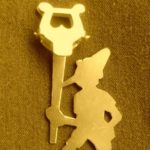"What is the best melodica to use for a specific music genre"
Tagged: #Melodica by Genre
- This topic has 4 replies, 5 voices, and was last updated 5 years, 10 months ago by
 Joanna Funk.
Joanna Funk.
-
AuthorPosts
-
May 6, 2018 at 4:59 am #9853
 Melodica-MeParticipant
Melodica-MeParticipantI would like to start a new topic, “Whats the best Melodica for a specific music genre” I often find that I select a melodica to play or record based on the specific selection chosen. Is there a specific melodica that fits a specific genre of music better than another? We all play different melodicas, and we probably all play different types of music. If you only play one melodica and you play different genres of music, do you wish you had a different melodica to play? If you play classical, pop, Jazz, blues, world, or traditional music from your country and region, do you prefer a specific melodica for these selections, let us know why you choose your Melodica or if you chose your melodica based solely on cost. Please share your thoughts, this may help others who are curious as well.
Melodica-MeMay 8, 2018 at 12:20 am #9867 Alan BrintonParticipant
Alan BrintonParticipantThis is a fascinating question that I hope others will address. I am almost always working on Jazz standards, trying to learn improvisation and playing the same tune in different styles and multiple keys.
I don’t have an opinion about which melodicas are best for Jazz, but I do find myself choosing to use different ones (from my vast collection) in working on different tunes. The current Yamahas more often than not, except for the obscure little yellow Suzuki Study II 25, from which I feel I consistently get the best sound. I’m looking for a woodwind sound and ease in manipulating it in striving for bluesy, jazzy effects.
It may just be me, but I find it easier to get a Jazz sound out of a smaller melodica, especially from a 25-27 key model. My guess is that I’d feel even more this way playing blues, where the smaller number of keys would pose fewer limitations.
May 8, 2018 at 4:23 pm #9871 DarenKeymaster
DarenKeymasterI play a lot of Irish music, and tend to use my ebony P37D. I’m a great fan of of the harmonica style reeds of the Yamahas, Suzukis etc because of the expressive capabilities, which I find suited to folk and jazz. And they give a good “bounce” for Irish music.
For classical and fairground styles, I’ve used the Vibrandoneon Mk I a lot. The tuning is stable, so it works with other classical instruments, and has a fullness and sweetness of tone.
I used the Clavietta once when I had to record a solo section with a string orchestra. It was recorded with a vintage mic, which added loads of depth and character.
May 19, 2018 at 1:09 pm #9918 LowboyParticipant
LowboyParticipantHi All,
I am always trying to apply the melodica to various genres for fun. I am impressed by how many genres I can fit my Hohner melodicas into. But that is for casual fun. My real interest is playing the blues.
For blues music, I believe my Hohners are the best for me. Other melodicas can work in the blues of course, but for me, the darker sound of the Hohner Piano 26, 27, and 32s (HM-26, HM-27, HM-32) are perfect for the blues. All these melodicas are out of production.
In a purely acoustic blues setting (no amps), they have no peer in my opinion.
Even given my narrow focus of music and the melodica models I play, processing such as EQ can provide a wide range of achievable tonality in a recording or live performance setting. If I want–through my setup and processing–I can make these typically dark-sounding melodicas shriek with brightness.
So, if you are trying to select a melodica for a given genre, listen at the base tonality of the instruments you are considering. You have to like that first. Then use processing to bring out that base tonality and shape the sound for a personal style.
I think I am getting to a sound I like after all these years. (I have said this many times before.)
My goal now is not to imitate a harmonica, but rather to create a unique sound that does not sound like any other melodica nor any other instrument. I am trying to get my melodica to sound like a clarinet, soprano sax, and melodica all rolled into one.Currently, I am finding the Hohner Piano 32 (HM-32) to be my favorite. It sounds smoother and slightly deeper than the Piano 26. I can play high notes without losing my breath, and when I have plenty of air, I can go down low. It is not too big and not too small.
I am using an SM-57 microphone directly into a super-high-quality Presonus rackmount channel strip when I get the benefit of a great mic preamp, incredibly transparent and mild compression, and a three-band semi-parametric EQ. I use a LWBC delay in the effects loop to add depth to the sound.
I use conventional EQ technique to make the sound fit into the mix. I usually cut below 400 and cut a lot above 5,000.
I am using a Vox C4 4-watt tube amp or a Vox C10 10-watt tube amp with built-in reverb.
As I have said many times before, the ability to muffle the sound of these Hohner melodicas against my chest adds a huge helping of instant modulation. Nothing else is like it, and I feel lost when playing a regular melodica.
Regards,
Lowboy
June 17, 2018 at 9:14 am #10002 Joanna FunkParticipant
Joanna FunkParticipantI don’t have many melodicas, and am always playing jazz standards. After joining this group, I’ve been persuaded to regard the melodica as a wind instrument, and focus on expression, phrasing and breathing, rather than fingerwork. I know a few European songs which the melodica seems to suit – La Vie En Rose, Come Back To Sorrento, etc. But I only know a handful of of those songs. Lately I’ve tried to play some chords, to see what the effect is like, maybe like a harmonica?
-
AuthorPosts
- You must be logged in to reply to this topic.
